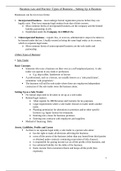7.
What are the basic concepts of a company?
Answer: • There is a division of responsibility which imposes a degree of formality that a sole trader or partner do not have:
o Directors – run the company on a daily basis, known collectively as ‘the Board’.
o Members (shareholders) – are the owners of the company who are usually only involved in the more important decisions affecting the company.
• In smaller private companies, it is highly likely directors and shareholders are the same people however it is essential for a legal purpose to distinguish who carries out what action.
• Most importantly a company has a separate legal entity separate from the shareholders and directors.
• This separate legal personality means the shareholders only have ‘limited liability’ for the debts of the company.
• Provided that they have paid in full for their share, the shareholders have no further liability to contribute to assets of the company should it experience difficulties in paying creditors.
• This concept was developed over many years and finally confirmed by the House of Lords in possibly the most famous case in company law, Saloman v Saloman 1897 – consider why this was developed.
• As enterprise developed (particularly during the industrial revolution) it became clear that one of the main factors hindering entrepreneurial risk-taking by wealthy individual was the risk of the business failing.
• If it did so, the whole of the individual’s wealth was at risk of being used to meet the debts of the failed business.
• Wealthy people were not prepared to risk their entire fortunes, but they were prepared to risk certain, limited amount.
• It was (and still is) perceived that it is important to encourage new enterprises (which inevitably involve an element of risk) for the benefit of the economy and society generally.
• New business creates jobs and new jobs create revenue and so on.
• However, a balance must be struck between protecting the personal assets of those who set up a new business and protecting those people go on to have dealings with it, such as customers, creditors and employees.




